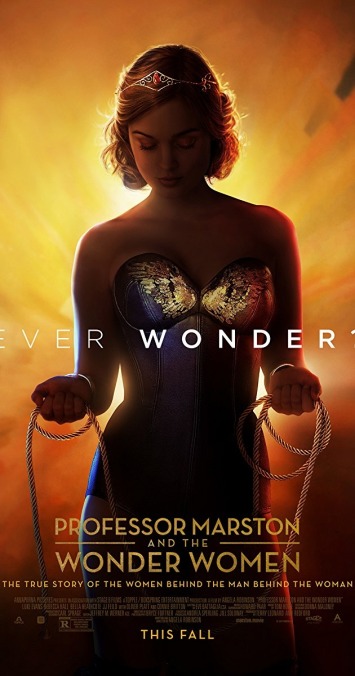But we’re getting ahead of ourselves. The film opens in the 1930s, as Olive signs up to serve as an assistant in the Marstons’ shared psychology lab. Elizabeth, a brilliant, stylish, foul-mouthed woman whose prickliness is the natural by-product of a lifetime of systemic sexism, is initially skeptical, but she comes around on the doe-eyed co-ed when she finds out that Olive comes from progressive stock. (Specifically, she is the niece of Margaret Sanger and daughter of Ethel Byrne, who co-founded America’s first birth control clinic in 1916.) Soon, the threesome’s intellectual flirtation turns romantic, but not before Olive inspires a breakthrough in the Marstons’ efforts to invent a scientific lie-detector test. (The test turned out to be less scientific in real life, but again: fantasy.)
Eventually, the secret of this polyamorous arrangement gets out, and the Marstons are drummed out of academia for their bohemian lifestyle. So the family movies to upstate New York, where they raise a houseful of children and Marston strikes gold with a new comic book character, Wonder Woman, a composite of the two women he loves—with some visual references to their shared interest in rope bondage for good measure. All this is structured around a competing set of framing devices, one laying out the specifics of Marston’s DISC (Dominance/Inducement/Submission/Compliance) theory through object lessons in the kinky professor’s own life, and another where Marston is interrogated about his comics creation and its effect on young minds by children’s media watchdog Josette Frank (Connie Britton).
On paper, this is all terribly titillating. But Robinson films the Marstons’ and Byrne’s story, from their thrilling verbal sparring to their tastefully restrained three-way sex scenes, in a style reminiscent of—for lack of a better term—a late-’90s Miramax release, all glowing golden light behind perfectly coiffed pin curls and mawkish orchestral themes. Think A Beautiful Mind but with bondage instead of schizophrenia, or The Imitation Game but with polyamory and bisexuality instead of homosexuality.
As in those films, the period style in Professor Marston And The Wonder Women is impeccable, particularly in the costuming, and the cast is as compelling to watch as the actors’ reputations might suggest. Hall in particular brings real vulnerability and depth to the character of Elizabeth, a quality that’s sadly missing in both her male and female partners. (William is the classic American alpha male, all strong chin and vigorous determination; Olive, the domestic goddess, soft, kind, and eager to smooth over any discord in her little family.) But it’s difficult to overlook the fact that, while the details of Marston’s life might be fascinating and fresh, stylistically the film is working off of a pre-established template, and a rather stale one at that.
In interviews and in Q&As about the film, Robinson has indicated that the style of Professor Marston And The Wonder Women was not the result of a lack of vision, but a deliberate creative choice. And it’s a noble goal, attempting to normalize a kind of relationship that is frequently misunderstood by wrapping it up in a glossy, familiar package. But if moviegoers don’t know that Robinson is deliberately trying to portray the Marstons’ love the same as any other love, will they appreciate her progressive intentions? Or will they just forget all about them—and the movie—by the time they reach the parking lot?


 Keep scrolling for more great stories from A.V. Club.
Keep scrolling for more great stories from A.V. Club.